Mission: Impact podcast & blog
Build a better world without becoming a martyr to your nonprofit cause
Listen on:
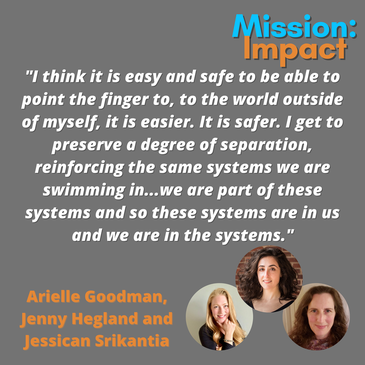 This week we’re talking to Arielle Goodman, Jenny Hegland and Jessica Srikantia. We talked about:
Resources mentioned: Otto Schwarmer and the MIT Presencing Institute www.ottoscharmer.com/ www.presencing.org/ Thomas Huebl thomashuebl.com/ Arielle, Jenny and Jessica are a team of colleagues that has been working together for the past six months to discover how they might be of service as a collective. Their work exists in cultivating the spaces between, such as in-between people during times of transition and not knowing, spaces within our own selves, or the connective tissue of complex systems. Together, they explore what is possible in and from wholeness. They are committed to transforming themselves into alignment with life, so that they can support this work in the broader world inclusive of and beyond their individual selves. Their areas of expertise include navigating uncharted terrain in times of uncertainty, helping systems see and sense themselves, and practicing sacred relationships with team and stakeholder groups. Links: www.linkedin.com/in/jennyhegland www.linkedin.com/in/jessica-srikantia-206797173/ www.linkedin.com/in/ariellegoodman/ Click "Read More" for Transcript: 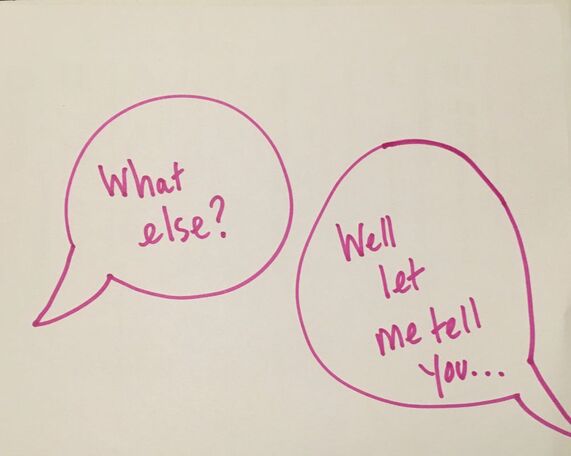 Through my strategic planning work I interview a lot of people. Most nonprofit consulting projects include some interviews or focus groups as part of the discovery process. I used to end my interviews with the question, “Is there anything else I need to know for this project/process?” Most of the time the answer would be, “no, nothing else.” Then one time I said, “What else do I need to know for this project/process?” And a whole lot more spilled out from the person I was talking with. “Is there anything else…?” “What else…?” doesn’t seem on surface to be very different. Yet it shifts the focus from a finite yes/no answer to the more open ended, “what else…?” And embedded in the question is the assumption that there is something else. Something else that I could not have anticipated in the questions I have already asked. Small tweaks can make a differenceIt seems like a little bit of a throw away. Yet often the most interesting and revealing answers are to that question.
So small tweaks can have a big impact. What small tweaks have you made recently in your work that had an impact?  When I get caught up in an anxiety spiral, my thoughts quickly go worse case scenario. Something has happened, I get triggered and I run straight up the ladder of inference, jumping to all sorts of conclusions. Too often I am not even conscious that I have leapt from an incident – something someone did or did not do, something someone said, even a facial expression – to all sorts of beliefs about that, and most critically -- accepting those beliefs as fact. The ladder of inference created by Chris Argyris breaks down what our brains do so naturally and so quickly. We jump from the observable data to the data we pay attention. We then assign meaning to it, make assumptions, jump to conclusions based on our beliefs and then often take action based on this chain of thought. All this can happen in a split second. I have found that the ABC framework is a useful tool for slowing myself down and examining the validity of my thoughts and conclusions. Originating in cognitive psychology and the work of Aaron Beck, the acronym stands for Adversity, Belief and Consequences The tool is useful because it gives you a framework to break down what just happened. Here is an example of how you would use the tool: This first step captures what just happened. The next step is to examine those thoughts and beliefs. Then one step further takes each of the worse case scenario beliefs, examines their likelihood and helps you play out alternative scenarios as well as make sounder decisions about next steps. Adversity: A colleague yawns during my presentation. The next time you find yourself caught in an unhelpful thought loop try this out for yourself. Learn more in the book The Resilience Factor by Karen Reivich, PhD and Andrew Shatte, PhD.
As a nonprofit leader and now nonprofit consultant, I consider myself a life-long learner. In fact ‘learner’ is one of my top five strengths in both the Gallup StrengthsFinder assessment as well as Via values assessment. I spent some time in December looking back at the year and one of the things that I thought about my year in terms of learning. Learning shows up in a couple different ways for me. I love to read and have shared short summaries of a few of the books I have read this year in these posts – summer book reviews – winter book reviews. I also ask myself the question, “what did I learn?” each week when I do my weekly reflection. Thus I capture the informal learning that emerges as I work. Designing learning experiences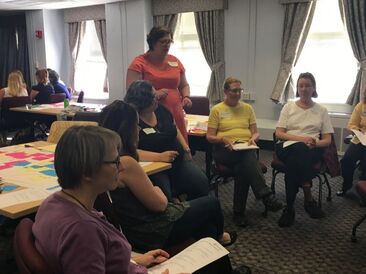 I design learning experiences for others as well. This year that included speaking engagements including workshops and sessions on a variety of topics:
I also created more in depth learning experiences for others. I led day-long workshops on building partnership and board development for a network of nonprofits as part of a longer series of trainings on strengthening organizational sustainability. One of the highlights of the past year was partnering with a colleague and 14 (relatively) new executive directors to facilitate a program designed to meet their specific needs. Through content and peer coaching, the group evolved over the course of eight months from a collection of individuals to a group who trusted each other with their most pressing challenges. It was so rewarding to support and help cultivate that shift. Nonprofit evaluative practice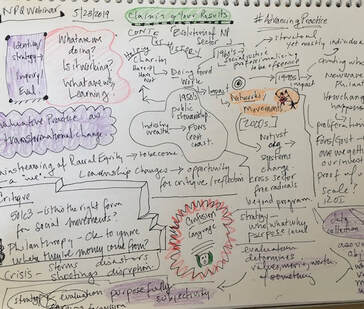 Claiming Your Results Claiming Your Results I participated in formal learning experiences offered by others. When I do, I practice my novice sketch-noting skills. A few highlights included: Nonprofit Quarterly’s webinar series on evaluative practice led by Jara Dean-Coffey and Jeanne Bell. The series stretched my conception of program evaluation and building learning organizations. My biggest take-away was the caution to be mindful of the purpose of any research. Part of this means making explicit the recognition that evaluation is always inherently subjective, even though it is often perceived as objective and the arbiter of worth and value. Being mindful of equity in evaluationToo many evaluation and other research efforts for programs that serve marginalized communities have been designed with the organization or researcher’s needs in mind, leaving the impact on the community out of the picture. The impact of this approach may be unintended or unintentional yet is extractive nonetheless. Learning and evaluation needs to be in service of the mission and mindful of impact, not just because one is curious. Learning with the brain in mind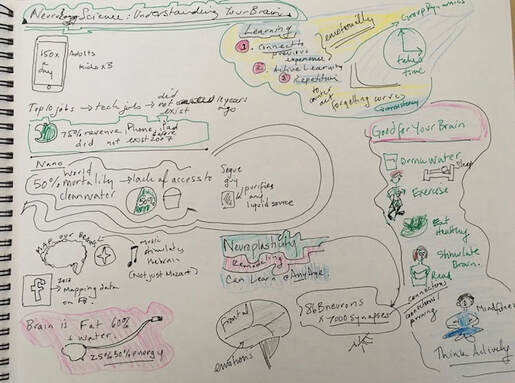 A session at American Society for Association Executive's (ASAE) Annual Conference in August focused on the basics of neuroscience and learning. Scientists now know that as adults we have neuroplasticity. So old dogs can learn new tricks! Designing learning with the brain in mind includes connecting the new information/content emotionally to the person’s previous experience, working with the material actively and repetition. It was good to hear that keeping my brain healthy includes all the habits we all have heard are healthy generally – staying hydrated, getting enough sleep, moving regularly, eating healthy, cultivating mindfulness and stimulating our brain on a regular basis. The last few years I have managed to make all of those regular practices, especially by reminding myself – something is better than nothing. Mission focused Collaboration Networks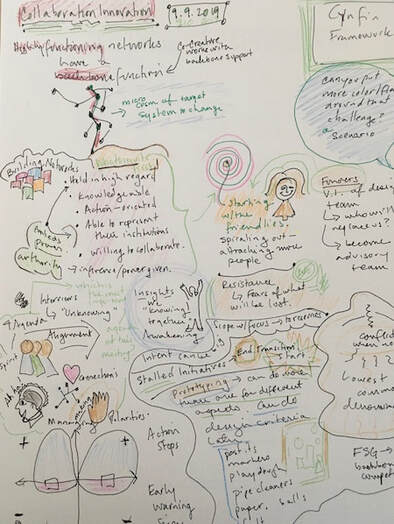 An exciting intensive training that I participated in focused on Collaborative Innovation. It centered on how to build collaborative networks intentionally to bring together organizations and groups of people. Networks have the potential to solve wicked problems beyond the capacity of one organization. Yet collaboration can be challenging and time intensive. By incorporating aspects of human centered design with iteration, rapid prototyping and testing, the network can move to action and not get bogged down in analysis paralysis. When started with intention they include both the power brokers in a system and those impacted by the system at the grassroots level, starting with the friendlies and then spiraling out. Harvesting in facilitation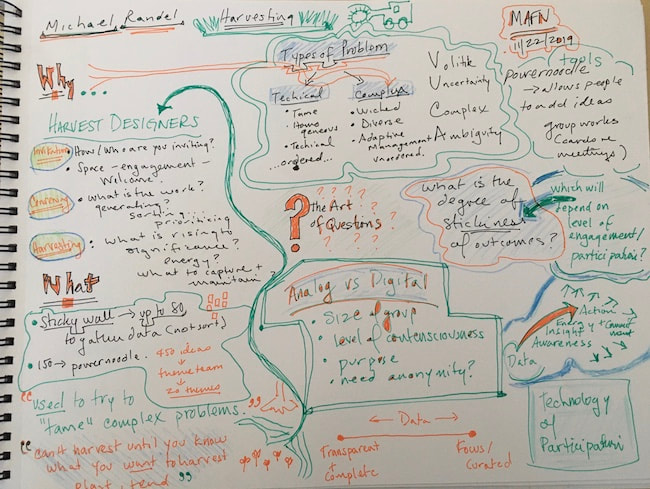 An important skill in facilitating is harvesting -- designing a meeting, a convening, a retreat with a set of intentions and outcomes in mind that will be harvested from the conversation. The degree of stickiness of the outcomes from a process is dependent on the level of engagement of those participating. When people talk about buy in, they need to remember that buy in is built not bought. Just telling people about a vision or a direction is not enough. Dewey contended that there is no real learning without reflection. “We do not learn from experience... we learn from reflecting on experience.” What are you reflecting on as the new year launches?
 Too many people – especially women – suffer from perfectionism. While it used to be that this was the perfect “weakness” to admit in a job interview, perfectionism gets in the way of performance rather than enhancing it. Perfectionists live in fear of mistakes. Gripped in this fear, they struggle with committing to a course of action, to get started, or to finish a project. Try and make mistakes I was talking to someone who was in the throws of perfectionism. I joked – why not try and make mistakes? Set that as your goal. Make as many mistakes as possible today. I was joking but why not give it a try. You can’t learn without making mistakes so rather than avoid them why not try to have them? This seems very counterintuitive yet if you were to approach your day that way I am guessing you would jump into action – because how else would you up your mistake ante? Also I would guess that you are unlikely to make a lot of mistakes, but making that goal might make them seem a little less scary. What’s the “right” place to start? Another person was trying to figure out the “right” way to start doing more strategic work with her board. There were lots of reasons that the board was in an operational mode. Crises in the past had forced it to shift its focus to the day-to-day. With the crisis past it had not yet shifted gears. There were lots of possible ways to get started. But she was paralyzed with looking for the “right” one – the strategic one. Certainly there is value in being strategic for greater impact and efficiency. But searching for the perfect strategic action can also have the impact of not taking any action. My feedback to her – pick one and start as an experiment. See how it goes. It might not be the “right” one and if not, adjust and try something new. Planning and experimenting I love planning and love working with organizations to help them think through their future direction to help them be more strategic. At the same time, organizations trip themselves up when they fall into the trap of thinking that they can plan out everything in detail at the outset. You just do not know what of your plans will be a ‘mistake’ or a learning opportunity. The ‘mistake’ provides you the opportunity to shift gears and try something new. Try thinking of your plan as a series of experiments. This way you can hold the plan more lightly and be more open to learning. Identify a couple big goals to set your own or your organization’s direction. Plan in more detail for the first year of implementation, especially first actions. Then get started.
Need help thinking about how to get started? Inquire about a complementary coaching session. |
Archives
April 2024

Grace Social Sector Consulting, LLC, owns the copyright in and to all content in and transcripts of the Mission: Impact podcast, as well as the Mission: Impact blog with all rights reserved, including right of publicity.
|
Telephone301-857-9335
|
info[at]gracesocialsector.com
|
Grace Social Sector Consulting, LLC, owns the copyright in and to all content in, including transcripts and audio of the Mission: Impact podcast and all content on this website, with all rights reserved, including right of publicity.
|